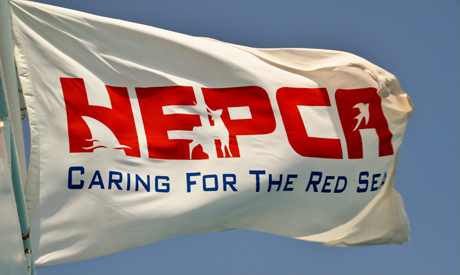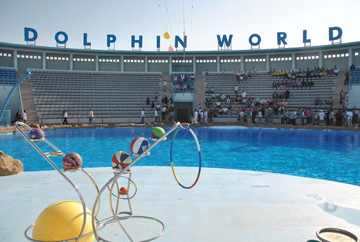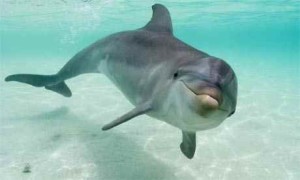 From HEPCA: HEPCA and the Red Sea community are once again caught in the middle of a dolphin captivity scandal, brought to you by none other than Dolphin World Egypt – Makadi Bay.
From HEPCA: HEPCA and the Red Sea community are once again caught in the middle of a dolphin captivity scandal, brought to you by none other than Dolphin World Egypt – Makadi Bay.
On April 19, 2013 HEPCA was informed that 2 live dolphins had arrived to the Hurghada airport at about 12:30am. The dolphins were being discreetly transported to the dolphinarium in Makadi under the cover of night. Yet despite Dolphin World’s attempts to hide this activity; everyone will still know that Dolphin World Egypt is profiteering of the backs of dead dolphins.
Just over 2 years ago in August of 2010, our community exposed another dolphinarium company holding 4 captive dolphins in a tiny swimming pool in a residential area of Hurghada. The Sharm El Sheikh based company “Dolphina” was looking to expand their business into the Hurghada region. Much of the local community was outraged by the situation and we decided to take action. A massive community campaign then ensued against the dolphinarium, which culminated in the arrival of world renowned dolphin activist Ric O’barry.
Following our campaign, the Red Sea Governor issued a decree; which explicitly bans the import of any mammal, whether marine or terrestrial, caught from the wild.
Yet despite the governor’s decree and our communities protesting and warnings about the inevitable death of these captive dolphins; the Sharm el Sheikh based “Dolphina” continued on with no regard to the dolphins, or our community’s objections.
The establishment of dolphinariums in the Red Sea, where dolphins are sighted on almost a daily basis, makes absolutely no sense. The dolphinarium industry funds the bloody massacre that goes into capturing dolphins, as well as the inevitable demise of the poor animal once in captivity.

Dolphin World Egypt is now dealing with the deadly consequence of holding a dolphin in captivity. They are importing two new dolphins to replace the ones that recently died while under their care, which is the ultimate end for most of the cetacean that are kept in captivity.
“Capture of wild cetaceans, regardless of methodology, is undeniably stressful (NOAA Fisheries 2002; Curry 1999) and animals can face as much as a six-fold increase in mortality risk in the first month after capture.” (Small R.J. and D.P. DeMaster 1995. Acclimation to captivity: A quantitative estimate based on survival of bottlenose dolphins and California sea lions. Mar. Mamm. Sci. 11:510-519.)
The criminal cartels that make up the dolphinarium industry provide the funding for the brutal massacre of thousands of dolphins every year in places like Taiji. Dolphin trainers from around the world are flown to these locations every year to take their pick from terrified dolphins, which are captured in the most brutal ways. The dolphins are aggressively chased into shallow water and then encircled or trapped by boats or net. Dolphin trainers then take their pick separating desirable specimens from the rest of their pod, while the rest are brutally slaughtered in pools of their own blood.
HEPCA and the Red Sea community have had enough and we can’t stand by silently while 2 more dolphins slowly die. We know that the 2 dolphins that were just brought into Hurghada were purchased from Ukraine and most likely originated from the Black Sea. The CITIES certificates that came with the dolphins indicated that they were purchased while already in captivity, and we’ve also confirmed that they made a transit in Antalia, Turkey before making their final stop in Hurghada. Egypt has fully supported the CITIES agreements, but what’s the point when loopholes still exist that allow the dolphinarium industry to continue its massacre of cetaceans all across the world.
 According to Governmental Decree 314/2010; the import of any mammal caught from the wild, whether marine or terrestrial is illegal. We are urging the governor of the red sea and minister of environment to help us put a stop to this and we need stricter legislation to ensure the protection of endangered species.
According to Governmental Decree 314/2010; the import of any mammal caught from the wild, whether marine or terrestrial is illegal. We are urging the governor of the red sea and minister of environment to help us put a stop to this and we need stricter legislation to ensure the protection of endangered species.
In regards to these poor dolphins currently being held captive in Makadi; our options are limited and we are running out of time. We can’t simply release these dolphins into Red Sea waters without the potential of risking serious contamination to our local dolphin species.
We are holding Dolphin World Egypt personally responsible for the safety and well being of these dolphins and will continue to update you with the developments. In the meantime, HEPCA will be lobbying the government to enforce a complete ban on the importing of any cetaceans into the Red Sea regions (whether they are born in captivity or not).
Dolphin World Egypt – we have one message for you; NO TANK YOU!







